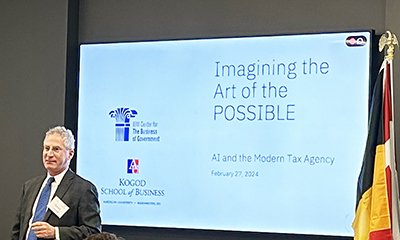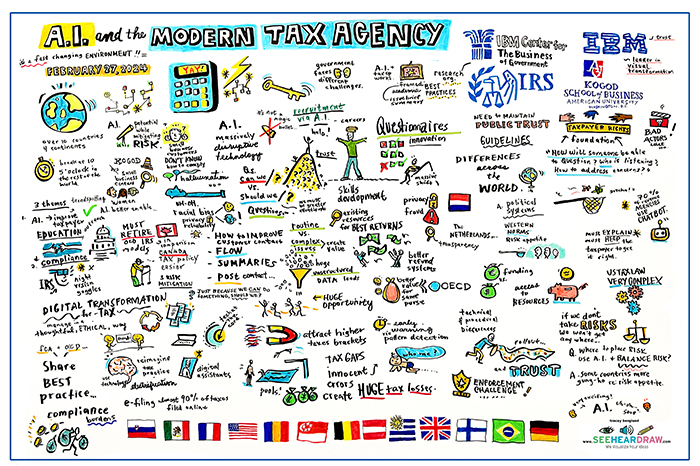
How to Use AI to Transform the Taxpayer Experience and Tax Agency Operations

Camille Johnson, Associate Consultant, Talent Transformation, IBM and Collin Coil, Research Assistant, Kogod Tax Policy Center contributed to this blog post.
The Administration’s Executive Order on the Safe, Secure, and Trustworthy Development and Use of Artificial Intelligence has led to new developments for the Internal Revenue Service (IRS) and other tax agencies. AI has revolutionized tax processes across the globe, in the IRS and the world.
The IBM Center for The Business of Government in collaboration with American University’s Kogod Tax Policy Center (KTPC), recently hosted the second global discussion in the AI in the Modern Tax Agency series, “Adopting and Deploying AI to Improve Tax Administration.” The roundtable included some fifty tax agency leaders, academics, think tanks, and thought leaders from twelve countries.
Caroline Bruckner, Managing Director of KTPC, began the roundtable by presenting highlights from the report of the first global discussion AI and the Modern Tax Agency: Adopting and Deploying AI to Improve Tax Administration, a study published in partnership with American University scholar and AI researcher, Collin Coil. Bruckner highlighted the impact that AI could have on tax literacy, outreach, and education, including for for small businesses.
The Organization for Economic Cooperation and Development (OECD) Forum on Tax Administrators (FTA), represented by Paul Marsh, then provided insights on the FTA’s Tax Administration 3.0 project, which is dedicated to re-imagining the tax structures of OECDmember tax agencies from over 50 countries. Marsh discussed how AI provides many opportunities to improve taxpayer service, but also presents the possible risks.
Specfiically, 85% of individual taxpayers and 90% of businesses now file taxes digitally, according to the Tax Administration 2023 report published by FTA. And 80% of tax agencies around the world are implementing leading-edge techniques to capture taxpayer data, with over 60% using virtual assistants -- FTA research indicates this represents a 30% increase from 2018. 24/7 Chatbots add to the opportunity for AI in tax agencies by decentralizing tax support; errors resulting in incorrect returns are often incidental among low- and middle-income taxpayers due to confusion or gaps in tax education. Developing virtual assistants with AI capabilities allows for compliance-by-design tax systems, providing early warnings of incidental errors made by taxpayers that can create huge tax losses for governments.
The FTA estimates almost 95% of tax agencies currently use data science and analytical tools to guide compliance. However, adding more advanced AI applications to an agency’s toolkit comes with risks. Notably, agencies need to address concerns around data privacy and protection, reliability, tax rights, and hallucinations from generative models. Furthermore, biases against marginalized groups remains a risk. Current risk mitigation strategies, including having human-in-system roles and robust training data, are not necessarily enough. Every country needs to independently determine appropriate risk management strategies for AI, accounting for the complexity of their tax policies and public trust. To helo governments address AI policy strategies, the OECD AI Network of Experts released the Measuring AI Compute survey about impacts of including AI in governance policies. Tax agencies around the world are still defining the metrics of a successful AI implementation.
At the roundtable, participants pinpointed key indicators of success in two discussions, one on “Improving the Taxpayer Experience" and another on “Streamlining Tax Operations.” UX (“user experience”) was found to be a key metric in the defining success. Based on insights from roundtable participants, example metrics that tax agencies may want to adopt to demonstrate outcomes for AI from include:
- Increase call center success to xx%, reducing costs by $xx per year.
- Increase usage of agency online information by xx%.
- Shorten refund delays on incidental errant filings by xx%.
- Deploy new tools to improve audit quality of investigations by xx, while reducing the duration by xx%.
It was clear that IRS and global tax agency leaders seek to deliver a personalized and supportive experience for taxpayers, especially for vulnerable populations. Additionally, the discussions provided expert views into the dependencies that may impact the success of AI in tax agencies. These include sufficient funding, as well asand public trust in the tax system. Global collaboration to advance AI in tax agencies is a crucial dependency. Finally, attracting AI talent to federal spaces is essential to ensuring that tax agencies will implement AI responsibly.
An illustration of key points from the session appears below.

(Artist Tracy Kleinman’s depiction of the AI and the Modern Tax Agency Roundtable)
Next Steps
The IBM Center and KTPC will author additional posts with specifics on each of the sessions. We invite comments based on this series that will help expand on ideas and experiences from around the world.



